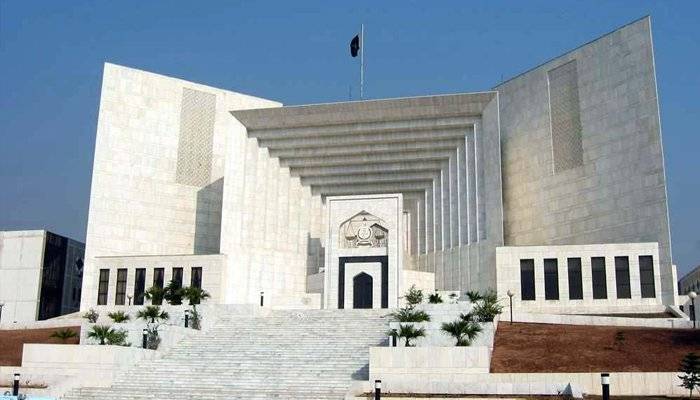
During hearing of the presidential reference seeking the apex court’s opinion on Article 63-A, Justice Ijazul Ahsan said that a disqualified lawmaker would remain disqualified until the court decided to cancel the disqualification. Article 63-A of the Constitution deals with the disqualification of lawmakers over floor-crossing.
The apex court comprised of a five-member bench consisting of Chief Justice Umar Ata Bandial, and also comprising Justice Mazhar Alam Khan Miankhel, Justice Munib Akhtar and Justice Jamal Khan Mandokhail.
The ousted Pakistan Tehreek-e-Insaf (PTI) government was represented by Babar Awan, and Pakistan Muslim League-Quaid (PML-Q) was represented by Azhar Siddique.
The PTI lawyer was seeking a clarification on the duration of disqualification of a dissident lawmaker under Article 63-A. "If the time period is not determined then the disqualification is for life," he contended.
The argument put forward by Babar Awan on behalf of Imran Khan was that even lawmakers who are disqualified for non-payment of utility bills are deemed ineligible to be re-elected to parliament.
Justice Mandokhail questioned whether the lawmaker would continue to remain disqualified if they paid their outstanding utility bills before the next election.
Justice Ahsan answered and said “The disqualification would end once the outstanding dues are paid. Only disqualification under Article 62(1)(f) is for life." Article 62(1)(f) pertains to the precondition for a member of parliament to be sadiq and ameen (honest and righteous).
He observed that the disqualification will be upheld until the declaration is cancelled by the court, and said that disqualification for the non-payment of utility bills cannot be for life.
Babar Awan replied that it was an insult to Article 63-A if a disqualified lawmaker could return to parliament within 15 days and potentially be made a minister again.
Justice Miankhel responded and said that he considers the violation of Article 63(1)(g) to be a more serious crime, which disqualifies lawmakers on account of defaming the army and the judiciary.
Justice Ahsan observed that the practice of “buying and selling lawmakers” should come to an end, as it jeopardizes the future of 220 million citizens.
The court then adjourned the hearing till 12 PM on Wednesday.
The apex court comprised of a five-member bench consisting of Chief Justice Umar Ata Bandial, and also comprising Justice Mazhar Alam Khan Miankhel, Justice Munib Akhtar and Justice Jamal Khan Mandokhail.
The ousted Pakistan Tehreek-e-Insaf (PTI) government was represented by Babar Awan, and Pakistan Muslim League-Quaid (PML-Q) was represented by Azhar Siddique.
The PTI lawyer was seeking a clarification on the duration of disqualification of a dissident lawmaker under Article 63-A. "If the time period is not determined then the disqualification is for life," he contended.
The argument put forward by Babar Awan on behalf of Imran Khan was that even lawmakers who are disqualified for non-payment of utility bills are deemed ineligible to be re-elected to parliament.
Justice Mandokhail questioned whether the lawmaker would continue to remain disqualified if they paid their outstanding utility bills before the next election.
Justice Ahsan answered and said “The disqualification would end once the outstanding dues are paid. Only disqualification under Article 62(1)(f) is for life." Article 62(1)(f) pertains to the precondition for a member of parliament to be sadiq and ameen (honest and righteous).
He observed that the disqualification will be upheld until the declaration is cancelled by the court, and said that disqualification for the non-payment of utility bills cannot be for life.
Babar Awan replied that it was an insult to Article 63-A if a disqualified lawmaker could return to parliament within 15 days and potentially be made a minister again.
Justice Miankhel responded and said that he considers the violation of Article 63(1)(g) to be a more serious crime, which disqualifies lawmakers on account of defaming the army and the judiciary.
Justice Ahsan observed that the practice of “buying and selling lawmakers” should come to an end, as it jeopardizes the future of 220 million citizens.
The court then adjourned the hearing till 12 PM on Wednesday.

